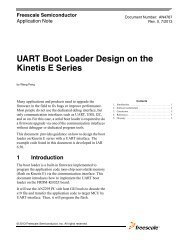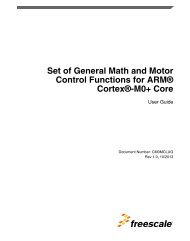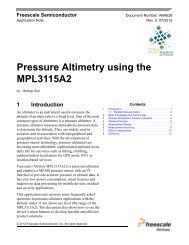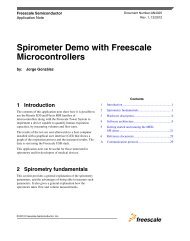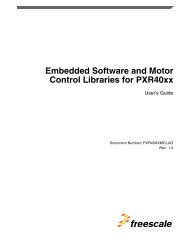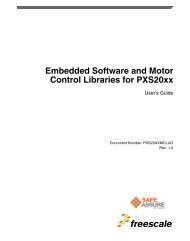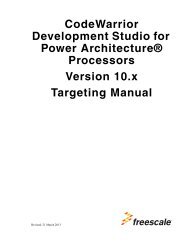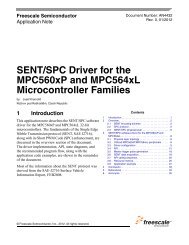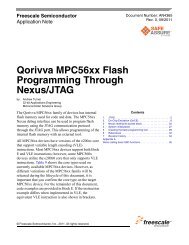MPC8548 PowerQUICC III Silicon Changes from Version 2.1.x to ...
MPC8548 PowerQUICC III Silicon Changes from Version 2.1.x to ...
MPC8548 PowerQUICC III Silicon Changes from Version 2.1.x to ...
Create successful ePaper yourself
Turn your PDF publications into a flip-book with our unique Google optimized e-Paper software.
Freescale Semiconduc<strong>to</strong>r<br />
Application Note<br />
<strong>MPC8548</strong> <strong>PowerQUICC</strong> <strong>III</strong> <strong>Silicon</strong><br />
<strong>Changes</strong> <strong>from</strong> <strong>Version</strong> <strong>2.1.x</strong><br />
<strong>to</strong> <strong>Version</strong> 3.1.x<br />
By Freescale Semiconduc<strong>to</strong>r, Inc.<br />
The <strong>MPC8548</strong> <strong>PowerQUICC</strong> <strong>III</strong> integrated processor<br />
version 3.1.x silicon built on Power Architecture®<br />
technology incorporates changes <strong>to</strong> fix known errata. This<br />
document describes the differences between version <strong>2.1.x</strong><br />
and version 3.1.x.<br />
© 2012 Freescale Semiconduc<strong>to</strong>r, Inc. All rights reserved.<br />
Document Number: AN4191<br />
Rev. 0, 02/2012<br />
Contents<br />
1. System and Processor <strong>Version</strong> . . . . . . . . . . . . . . . . . . 2<br />
2. Errata Difference Summary . . . . . . . . . . . . . . . . . . . . 2<br />
3. Software Impact of Errata Differences . . . . . . . . . . . . 5<br />
4. Revision His<strong>to</strong>ry . . . . . . . . . . . . . . . . . . . . . . . . . . . . 17
System and Processor <strong>Version</strong><br />
1 System and Processor <strong>Version</strong><br />
Table 1 provides a cross-reference <strong>to</strong> match the revision level <strong>to</strong> the processor version register (PVR) and<br />
the system version register (SVR). Software that uses the PVR or the SVR must take in<strong>to</strong> account the<br />
changes in these values with silicon version 3.1.x.<br />
SC8548HMPC854<br />
8/E Revision<br />
Table 1. Revision Level <strong>to</strong> Part Marking Cross-Reference<br />
e500 v2 Core<br />
Revision<br />
Processor <strong>Version</strong><br />
Register Value<br />
2 Errata Difference Summary<br />
This section describes the errata differences in <strong>MPC8548</strong> between versions <strong>2.1.x</strong> and 3.1.x.<br />
2.1 Full Errata Fix Implemented in Rev 3.1.x<br />
System <strong>Version</strong><br />
Register Value<br />
2.0 2.0 0x8021_0020 With security<br />
0x8039_0020<br />
Without security<br />
0x80310020<br />
2.1.1 2.2 0x8021_0022 With security<br />
0x8039_0021<br />
Without security<br />
0x80310021<br />
2.1.2 2.2 0x8021_0022 With security<br />
0x8039_0021<br />
Without security<br />
0x80310021<br />
3.1.x 2.3 0x8021_0023 With security<br />
0x8039_0031<br />
Without security<br />
0x80310031<br />
Table 2 lists the silicon version <strong>2.1.x</strong> device errata which have had a full fix implemented in silicon version<br />
3.1.x.<br />
Table 2. Summary of <strong>Silicon</strong> Errata Fixed in <strong>MPC8548</strong> Rev 3.1.x<br />
Errata Name<br />
eTSEC<br />
eTSEC 34 Transmit frames aborted under 16-bit FIFO GMII-style mode<br />
eTSEC 38 WWR bit Anomaly<br />
eTSEC 57 RQUEUE[EXn] bits have no effect<br />
eTSEC 58 Parsing of MPLS label stack or non-IPv4/IPv6 label not supported<br />
eTSEC 59 Arbitrary extraction on short frames uses data <strong>from</strong> previous frame<br />
eTSEC 62 eTSEC half duplex receiver packet corruption<br />
<strong>MPC8548</strong> <strong>PowerQUICC</strong> <strong>III</strong> <strong>Silicon</strong> <strong>Changes</strong> <strong>from</strong> <strong>Version</strong> <strong>2.1.x</strong> <strong>to</strong> <strong>Version</strong> 3.1.x, Rev. 0<br />
Device Marking<br />
2M39E<br />
3M39E<br />
6M39E<br />
7M39E<br />
1N06D, 2N06D<br />
2 Freescale Semiconduc<strong>to</strong>r
Table 2. Summary of <strong>Silicon</strong> Errata Fixed in <strong>MPC8548</strong> Rev 3.1.x (continued)<br />
Errata Name<br />
eTSEC 63 May drop Rx packets in non-FIFO modes with lossless flow control enabled<br />
eTSEC 64 Back-<strong>to</strong>-back IPv6 routing headers not supported by parser<br />
eTSEC 65 RxBD[TR] not asserted during truncation when last 4 bytes match CRC<br />
eTSEC 66 Parser continues parsing L4 fields when RCTRL[PRSDEP] set for L2 and L3 fields only<br />
<strong>MPC8548</strong> <strong>PowerQUICC</strong> <strong>III</strong> <strong>Silicon</strong> <strong>Changes</strong> <strong>from</strong> <strong>Version</strong> <strong>2.1.x</strong> <strong>to</strong> <strong>Version</strong> 3.1.x, Rev. 0<br />
Errata Difference Summary<br />
eTSEC 68 Rx TCP/UDP checksum checking may be incorrect while operating at low frequencies in FIFO mode<br />
eTSEC 69 Filer does not support matching against broadcast address flag PID1[EBC]<br />
eTSEC 71 eTSEC filer reports incorrect Ether-types with certain MPLS frames<br />
eTSEC 72 Compound filer rules do not roll back the mask<br />
eTSEC 73 Incomplete frame with error causes false CR error on next frame<br />
eTSEC 74 eTSEC 74: Parser does not check VER/TYPE of PPPoE packets<br />
eTSEC 76 RMCA, RBCA counters do not correctly count valid VLAN tagged frames<br />
eTSEC 77 Tx errors truncate packets without error in 8-bit Encoded FIFO mode<br />
eTSEC 79 Generation of Ethernet pause frames may cause Tx lockup and false BD close<br />
eTSEC 81 eTSEC does not verify IPv6 routing header type field<br />
eTSEC 82 Transmission of truncated frames may cause hang or lost data<br />
eTSEC 83 L3 fragment frame files on non-existent source/destination ports<br />
eTSEC 85 TxBD[TC] is not reliable in 16-bit FIFO modes<br />
eTSEC 87 Arbitrary Extraction cannot extract last data bytes of frame<br />
eTSEC 88 False TCP/UDP and IP checksum error in FIFO mode without CRC appending<br />
eTSEC 89 Frames greater than 9600 bytes with TOE = 1 will hang controller<br />
eTSEC 90 Setting RCTRL[LFC] = 0 may not immediately disable LFC<br />
eTSEC 92 False parity error at Tx startup<br />
eTSEC 94 Rx packet padding limitations at low clock ratios<br />
eTSEC 95 False TCP/UDP checksum error for some values of pseudo header Source Address<br />
eTSEC 98 FIFO16 interface encoded mode maximum frequency is 1/4.2 platform clock<br />
eTSEC 99 ECNTRL[AUTOZ] not guaranteed if reading MIB counters with software<br />
eTSEC 104 Rx may hang if RxFIFO overflows<br />
eTSEC 105 Malformed Magic Packet Triggers Magic Packet Exit<br />
eTSEC 106 Excess delays when transmitting TOE=1 large frames<br />
eTSEC 107 Controller may not be able <strong>to</strong> transmit pause frame during pause state<br />
eTSEC-A001 MAC: Pause time may be shorter than specified if transmit in progress<br />
eTSEC-A004 User-defined preamble not supported at low clock ratios<br />
CPU<br />
Freescale Semiconduc<strong>to</strong>r 3
Errata Difference Summary<br />
Table 2. Summary of <strong>Silicon</strong> Errata Fixed in <strong>MPC8548</strong> Rev 3.1.x (continued)<br />
Errata Name<br />
CPU-A005 Enabling IEEE 754 exceptions can cause errors<br />
DMA 2 Transfer error reported for wrong channel<br />
DMA<br />
GEN<br />
GEN 11 Some pins do not meet 500V CDM ESD criteria<br />
GEN 13 CPU write <strong>to</strong> platform failures in all core, platform, and SYSCLK frequency combinations<br />
PCI-Express<br />
PCI-Ex 35 Rx detection by transmitter does not pass high receiver impedance test<br />
PCI-Ex 37 Completion Timeout error disable corrupts CRS threshold error data<br />
PCI-Ex 38 PCI Express LTSSM may fail <strong>to</strong> properly train with a link partner following HRESET<br />
PCI-Ex 39 No mechanism for recovery <strong>from</strong> hang after access <strong>to</strong> down link<br />
PCI-Ex 42 Reads <strong>to</strong> PCI Express CCSRs or local configuration space temporarily return all Fs<br />
PCIe-A001 PCI Express Hot Reset event may cause data corruption<br />
SRIO<br />
SRIO-A002 SRIO reset command does not result in device reset<br />
I2C 2 Enabling I2C could cause I2C bus freeze when other I2C devices communicate<br />
2.2 Partial Errata Fix Implemented in Rev 3.1.x<br />
Table 3 lists the silicon version <strong>2.1.x</strong> device errata which have had a partial fix implemented in silicon<br />
version 3.1.x.<br />
I2C<br />
Table 3. Summary of <strong>Silicon</strong> Errata Partially Fixed in <strong>MPC8548</strong> Rev 3.1.x<br />
Errata Name<br />
eTSEC<br />
eTSEC 67 Fetches with errors not flagged, may cause livelock or false halt<br />
eTSEC 84 Multiple BD frame may cause hang<br />
eTSEC 93 Transmit fails <strong>to</strong> utilize 100% of line bandwidth<br />
DMA 1 DMA_DACK bus timing violation when operating in external DMA master mode<br />
<strong>MPC8548</strong> <strong>PowerQUICC</strong> <strong>III</strong> <strong>Silicon</strong> <strong>Changes</strong> <strong>from</strong> <strong>Version</strong> <strong>2.1.x</strong> <strong>to</strong> <strong>Version</strong> 3.1.x, Rev. 0<br />
4 Freescale Semiconduc<strong>to</strong>r
3 Software Impact of Errata Differences<br />
Software Impact of Errata Differences<br />
This section describes the software impact of errata differences between silicon versions <strong>2.1.x</strong> and 3.1.x.<br />
3.1 Software Impact of Full Errata Fixes in Rev 3.1.x<br />
This section describes the software impact of full errata fixes in silicon version 3.1.x, including the impact<br />
of leaving the silicon version <strong>2.1.x</strong> workaround in software used with silicon version 3.1.x.<br />
3.1.1 eTSEC 34—Transmit Frames Aborted Under 16-bit FIFO GMII-style<br />
Mode<br />
Software workaround:<br />
Use of encoded mode for any 16 bit FIFO packet interface instead of GMII style signaling is<br />
recommended. The FIFO Encoded mode will not abort packets if underrun occurs; instead, it will<br />
assert idle bytes during the data stream.<br />
The workaround stated above has the same behavior on silicon versions <strong>2.1.x</strong> and 3.1.x. As a result of this<br />
erratum being fixed in silicon version 3.1.x, 16-bit FIFO mode can be used.<br />
3.1.2 eTSEC 38—WWR Bit Anomaly<br />
Software workaround:<br />
Set DMACTRL[WWR] = 0. The effect of setting DMACTRL[WWR] = 0 is that the interrupt may<br />
arrive at the processor before the update <strong>to</strong> the BD for the received packet that caused the interrupt<br />
has been completed in memory.<br />
This may or may not have any impact on the system depending on how packets are processed. If<br />
the CPU reads the BD immediately after the interrupt, then in heavily congested systems it is<br />
possible that the CPU completes a read of the BD before the BD is closed by the eTSEC so that the<br />
BD's Empty bit is still set.<br />
In this case, software can either exit the packet processing routine and service the packet upon<br />
receiving the next interrupt, or it can schedule another interrupt <strong>to</strong> process the packet later.<br />
Use of Rx interrupt coalescing of even a few packets reduce the chance of the CPU reading a BD<br />
whose update is still in flight <strong>to</strong> virtually zero, though it is still possible if multiple receive rings<br />
are in use.<br />
The workaround stated above has the same behavior on silicon versions <strong>2.1.x</strong> and 3.1.x. As a result of this<br />
erratum being fixed in silicon version 2.0/2.1, WWR = 1 is supported. Software that implements this<br />
workaround with silicon version 2.0/2.1 is not taking full advantage of the features supported in that<br />
version of silicon.<br />
3.1.3 eTSEC 57—RQUEUE[EXn] Bits Have No Effect<br />
For erratum eTSEC57 on silicon version <strong>2.1.x</strong>, there is no workaround.<br />
<strong>MPC8548</strong> <strong>PowerQUICC</strong> <strong>III</strong> <strong>Silicon</strong> <strong>Changes</strong> <strong>from</strong> <strong>Version</strong> <strong>2.1.x</strong> <strong>to</strong> <strong>Version</strong> 3.1.x, Rev. 0<br />
Freescale Semiconduc<strong>to</strong>r 5
Software Impact of Errata Differences<br />
In silicon version <strong>2.1.x</strong>, stashing is controlled by the eTSEC DMA ATTR register. As a result of this<br />
erratum being fixed in silicon version 3.1.x, ring-by-ring control of stashing is available via the<br />
RQUEUE[EXn] bits. To achieve the same behavior as Rev <strong>2.1.x</strong>, software must set all RQUEUE[EXn]<br />
bits <strong>to</strong> 0b1. By default, only EX0 is set <strong>to</strong> 1. If any of the EXn fields are set <strong>to</strong> 0b0, data transferred <strong>to</strong> the<br />
corresponding RxBD ring is not extracted <strong>to</strong> in<strong>to</strong> the L2 cache, potentially resulting in a negative<br />
performance impact.<br />
3.1.4 eTSEC58—Parsing of MPLS Label Stack or Non-IPv4/IPv6 Label Not<br />
Supported<br />
Software workaround:<br />
Limit MPLS Ether-type packets <strong>to</strong> MPLS label stack depth = 1 with IPv4 or IPv6 label.<br />
The workaround stated above has the same behavior on silicon versions <strong>2.1.x</strong> and 3.1.x.<br />
3.1.5 eTSEC59—Arbitrary Extraction on Short Frames Uses Data From<br />
Previous Frame<br />
Software workaround:<br />
• Option 1: Use only BnCTL = 01 (extract <strong>from</strong> offset of DA-8 bytes). For valid Ethernet frames<br />
(minimum length 64 bytes), the 6-bit offset cannot go beyond the end of the frame.<br />
• Option 2: Do not use the ARB filer property <strong>to</strong> reject frames if the controller may receive frames<br />
shorter than the location of any arbitrary extraction byte offset. Software must handle short frames<br />
that may be filed in the wrong queue.<br />
The workaround stated above has the same behavior on silicon versions <strong>2.1.x</strong> and 3.1.x. As a result of this<br />
erratum being fixed in silicon version 3.1.x, filing based on arbitrary extraction of bytes is supported.<br />
Software that implements this workaround with silicon version 3.1.x is not taking full advantage of the<br />
filing capabilities supported in that version of silicon.<br />
3.1.6 eTSEC62—eTSEC Half Duplex Receiver Packet Corruption<br />
Software workaround:<br />
The eTSEC can be configured through either the MAC address filter or the filer <strong>to</strong> discard such<br />
packets that are received in this manner through the use of MAC addresses filtering match and<br />
drop. The receive MIB counters may still incorrectly count packet errors. Use eTSEC loopback<br />
mode configuration for full-duplex operation.<br />
The workaround stated above has the same behavior on silicon versions <strong>2.1.x</strong> and 3.1.x.<br />
<strong>MPC8548</strong> <strong>PowerQUICC</strong> <strong>III</strong> <strong>Silicon</strong> <strong>Changes</strong> <strong>from</strong> <strong>Version</strong> <strong>2.1.x</strong> <strong>to</strong> <strong>Version</strong> 3.1.x, Rev. 0<br />
6 Freescale Semiconduc<strong>to</strong>r
Software Impact of Errata Differences<br />
3.1.7 eTSEC63—May Drop Rx Packets in Non-FIFO Modes with Lossless<br />
Flow Control Enabled<br />
Software workaround:<br />
• Option 1: Enable interrupts on transmit of pause frames (IMASK[TXCEN] = 1). For every<br />
interrupt due <strong>to</strong> pause frame transmission (IEVENT[TXC] = 1), enable a counter such as a cycle<br />
count in the Performance Moni<strong>to</strong>r block which would overflow and generate an interrupt after 2/3<br />
of PVT time. If the counter is already enabled, reset the count <strong>to</strong> 2/3 of PTV time. In the overflow<br />
event interrupt handler, check the current number of free receive buffer descrip<strong>to</strong>rs versus the<br />
threshold. If the number of free BDs are below the threshold, manually transmit a pause frame by<br />
setting TCTRL[TFC_PAUSE] = 1. This also restarts the lossless flow control state machine. In<br />
either case (free BDs above or below threshold), disable the counter until the next transmit control<br />
frame event.<br />
• Option 2: Enable interrupts on dropped packets due <strong>to</strong> lack of RxBDs (EDIS[BSYDIS] = 0,<br />
IMASK[BSYEN] = 1). On detecting a busy dropped packet event (IEVENT[BSY] = 1), manually<br />
transmit a pause frame by setting TCTRL[TFC_PAUSE] <strong>to</strong> restart the lossless flow control state<br />
machine.<br />
As a result of this erratum being fixed in silicon version 3.1.x, the above workarounds are no longer<br />
necessary. Software that implements this workaround with silicon version 3.1.x may result in a system<br />
transmitting more pause frames than necessary.<br />
3.1.8 eTSEC64—Back-<strong>to</strong>-Back IPv6 Routing Headers Not Supported by<br />
Parser<br />
Software workaround:<br />
Software must parse the L4 information out of packets that indicate PRO = 0xFF.<br />
The workaround stated above has the same behavior on silicon versions <strong>2.1.x</strong> and 3.1.x. As a result of this<br />
erratum fix in silicon version 3.1.x, parsing continues beyond the back-<strong>to</strong>-back routing headers and is<br />
reflected in the RxFCB.<br />
3.1.9 eTSEC65—RxBD[TR] Not Asserted During Truncation When Last 4<br />
Bytes Match CRC<br />
There is no workaround provided for erratum eTSEC65. As a result of this erratum fix in silicon version<br />
3.1.x, these truncated packets have their RxBD[TR] set. This does not have any impact on systems that<br />
send frames of size MAXFRM or smaller.<br />
3.1.10 eTSEC 66—Parser Continues Parsing L4 Fields When<br />
RCTRL[PRSDEP] Set for L2 and L3 Fields Only<br />
Software workaround:<br />
Knowing this behavior, the user can simply ignore the information associated with L4 pro<strong>to</strong>cols.<br />
In the case of filer PID = 1, the user must mask bits associated with TCP and UDP.<br />
<strong>MPC8548</strong> <strong>PowerQUICC</strong> <strong>III</strong> <strong>Silicon</strong> <strong>Changes</strong> <strong>from</strong> <strong>Version</strong> <strong>2.1.x</strong> <strong>to</strong> <strong>Version</strong> 3.1.x, Rev. 0<br />
Freescale Semiconduc<strong>to</strong>r 7
Software Impact of Errata Differences<br />
As a result of this erratum fix in silicon version 3.1.x, the L4 fields are not parsed when<br />
RCTRL[PRSDEP] = 0b10. Software that ignores L4 parsing information when RCTRL[PRSDEP] = 0b10<br />
continues <strong>to</strong> function in silicon version <strong>2.1.x</strong>.<br />
3.1.11 eTSEC68—Rx TCP/UDP Checksum Checking May be Incorrect<br />
While Operating at Low Frequencies In FIFO Mode<br />
Software workaround:<br />
• Option 1: Turn off Rx checksum checking by setting RCTRL[TUCSEN] = 0.<br />
• Option 2: Ensure that the minimum platform frequency <strong>to</strong> eTSEC Rx_CLK ratio with Rx<br />
checksum checking enabled in FIFO mode is greater than or equal <strong>to</strong> 4:1 (for example, 500 MHz<br />
platform frequency with 125 MHz Rx_CLK).<br />
• Option 3: Ensure that packets that are being checksummed have at least 4 bytes of data at the end<br />
of the packet that is not <strong>to</strong> be included in the checksum (such as a CRC)<br />
The impact of this workaround fix is that TCP/UDP header checksum generation is now supported at all<br />
platform:Rx_CLK ratios in silicon version 2.0/2.1.<br />
3.1.12 eTSEC69—Filer Does Not Support Matching Against Broadcast<br />
Address Flag PID1[EBC]<br />
Software workaround:<br />
Mask off matching on broadcast address flag (PID1[EBC] = 1) by clearing the bit 16 of the mask<br />
register. If the rule needs <strong>to</strong> be able <strong>to</strong> distinguish broadcast addresses as defined by IEEE Std<br />
802.3 – 2005 is all 1’s in the destination address field, then use a filer rule with PID3 and PID4<br />
(destination MAC address) <strong>to</strong> match on broadcast Ethernet frames.<br />
The workaround stated above will have the same behavior on silicon versions <strong>2.1.x</strong> and 3.1.x. As a result<br />
of this erratum fix in silicon version 3.1.x, the filer now supports matching based on broadcast address.<br />
3.1.13 eTSEC 71—eTSEC Filer Reports Incorrect Ether-types With Certain<br />
MPLS Frames<br />
Software workaround:<br />
Use arbitrary extraction bytes <strong>to</strong> compare <strong>to</strong> the actual Ether-type if a filer rule is intending <strong>to</strong> file<br />
based on an MPLS label existence.<br />
The workaround stated above has the same behavior on silicon versions <strong>2.1.x</strong> and 3.1.x. As a result of this<br />
erratum fix in silicon version 3.1.x, the correct Ether-type can be extracted <strong>from</strong> these types of packets.<br />
<strong>MPC8548</strong> <strong>PowerQUICC</strong> <strong>III</strong> <strong>Silicon</strong> <strong>Changes</strong> <strong>from</strong> <strong>Version</strong> <strong>2.1.x</strong> <strong>to</strong> <strong>Version</strong> 3.1.x, Rev. 0<br />
8 Freescale Semiconduc<strong>to</strong>r
Software Impact of Errata Differences<br />
3.1.14 eTSEC 72—Compound Filer Rules Do Not Roll Back the Mask<br />
Software workaround:<br />
When using a compound rule that consists of SETMASK rules, the user must put another<br />
SETMASK rule after the last rule in the chain that resets the mask <strong>to</strong> the value it was prior <strong>to</strong><br />
entering the chain.<br />
The workaround stated above has the same behavior on silicon versions <strong>2.1.x</strong> and 3.1.x. As a result of this<br />
erratum fix in silicon version 3.1.x, this additional SETMASK rule is no longer required.<br />
3.1.15 eTSEC73—Incomplete Frame with Error Causes False CR error on<br />
Next Frame<br />
Software workaround:<br />
To work around this problem when the link is down, typically the PHY generates a link down<br />
interrupt. When this link down interrupt is detected, software must do the following:<br />
a) Perform a soft_reset (MACCFG1[Soft_Reset] = 1) or a receiver reset (MACCFG1[Reset Rx<br />
Func] = 1)<br />
b) Keep the MAC in reset until the link is up again.<br />
c) Discard any frames received during link down.<br />
d) Re-enable the receiver after the link is up.<br />
The workaround stated above will have the same behavior on silicon versions <strong>2.1.x</strong> and 3.1.x.<br />
3.1.16 eTSEC 74: Parser Does Not Check VER/TYPE of PPPoE Packets<br />
There is no workaround provided for erratum eTSEC74. As a result of this erratum fix in silicon version<br />
3.1.x, the VER/TYPE field in PPPoE packets are checked by the controller.<br />
3.1.17 eTSEC 76: RMCA, RBCA Counters Do Not Correctly Count Valid<br />
VLAN Tagged Frames<br />
There is currently no work around for counting these packets other than software running on the core.<br />
As a result of this erratum fix in silicon version 3.1.x, RBCA and RMCA also increment for validly VLAN<br />
tagged Ethernet frames greater than 1518. Counting these packets in software is no longer necessary.<br />
3.1.18 eTSEC 77: Tx Errors Truncate Packets Without Error in 8-bit<br />
Encoded FIFO Mode<br />
Software workaround:<br />
Enable CRC append on Tx by setting FIFOCFG[CRCAPP] = 1 and CRC checking on Rx by setting<br />
FIFOCFG[CRCCHK] = 1. The truncation of the packet at the error presents a smaller than 1 in 4<br />
billion chance that the last four bytes of the packet match the running CRC32 calculation, ensuring<br />
that the packet is still seen is error.<br />
<strong>MPC8548</strong> <strong>PowerQUICC</strong> <strong>III</strong> <strong>Silicon</strong> <strong>Changes</strong> <strong>from</strong> <strong>Version</strong> <strong>2.1.x</strong> <strong>to</strong> <strong>Version</strong> 3.1.x, Rev. 0<br />
Freescale Semiconduc<strong>to</strong>r 9
Software Impact of Errata Differences<br />
The workaround stated above will have the same behavior on silicon versions <strong>2.1.x</strong> and 3.1.x. As a result<br />
of this erratum fix in silicon version 3.1.x, an invalid CRC is always appended when an error is detected<br />
for a transmit frame, regardless of the FIFOCFG[CRCAPP] value. Software-implemented CRCs are now<br />
supported with silicon version 3.1.x, since an invalid CRC will be appended if the frame has any error.<br />
3.1.19 eTSEC 79: Generation of Ethernet Pause Frames May Cause Tx<br />
Lockup and False BD Close<br />
Software workaround:<br />
• Option 1: Disable transmit flow control by setting MACCFG1[Tx_flow] = 0.<br />
• Option 2: Run with a minimum platform (CCB) frequency of 500 MHz <strong>to</strong> insure correct Ethernet<br />
operation at gigabit data rates. This workaround only applies <strong>to</strong> Ver <strong>2.1.x</strong>.<br />
• Option 3: Use the following method <strong>to</strong> detect TX lock up and recover <strong>from</strong> it.<br />
Moni<strong>to</strong>r Transmit Packet Counter TPKT and or Transmit Buffer Descrip<strong>to</strong>r Pointers TBPTRn by<br />
software and if no change is detected in the expected time (several multiple of maximum transition<br />
time), and the Transmit halt of ring n bits in the transmit status register TSTAT[THLTn] is not set,<br />
assume the transmitter is stuck by the above condition and proceed with the following recovery<br />
mechanism:<br />
a) Set DMACTRL[GRS] = 1 <strong>to</strong> perform a graceful receive s<strong>to</strong>p.<br />
b) Wait for IEVENT[GRSC] <strong>to</strong> be set, indicating s<strong>to</strong>p complete.<br />
c) Set DMACTRL[GTS] = 1 <strong>to</strong> perform a graceful transmit s<strong>to</strong>p.<br />
d) Wait for IEVENT[GTSC] <strong>to</strong> be set, indicating s<strong>to</strong>p complete.<br />
e) Write a 1 <strong>to</strong> IEVENT[GTSC] <strong>to</strong> acknowledge the event.<br />
f) Clear MACCFG1[Tx_Flow].<br />
g) Wait 256 TX_CLK cycles.<br />
h) Clear MACCFG1[Tx_EN].<br />
i) Wait 3 TX_CLK cycles.<br />
j) Set MACCFG1[TX_EN] and MACCFG1[Tx_Flow].<br />
k) Set DMACTRL[GTS] = 0 <strong>to</strong> clear the graceful transmit s<strong>to</strong>p.<br />
l) Set DMACTRL[GRS] = 0 <strong>to</strong> clear the graceful receive s<strong>to</strong>p.<br />
The workaround stated above has the same behavior on silicon versions <strong>2.1.x</strong> and 3.1.x. As a result of this<br />
erratum being fixed in silicon version 3.1.x, the workarounds are no longer necessary, but will not<br />
adversely impact device functionality.<br />
3.1.20 eTSEC 81: eTSEC Does Not Verify IPv6 Routing Header Type Field<br />
Software workaround:<br />
If this device is operating in a network that is using non-type0 IPv6 routing headers, then the upper<br />
layer processing (IPv6 extension headers and payload checksumming operations) must be<br />
performed in software.<br />
<strong>MPC8548</strong> <strong>PowerQUICC</strong> <strong>III</strong> <strong>Silicon</strong> <strong>Changes</strong> <strong>from</strong> <strong>Version</strong> <strong>2.1.x</strong> <strong>to</strong> <strong>Version</strong> 3.1.x, Rev. 0<br />
10 Freescale Semiconduc<strong>to</strong>r
Software Impact of Errata Differences<br />
Leaving this workaround in software used with silicon version 3.1.x results in a redundant check of routing<br />
type Value.<br />
3.1.21 eTSEC 82: Transmission of Truncated Frames May Cause Hang or<br />
Lost Data<br />
Software workaround:<br />
• Option 1: Disable truncation by setting MACCFG2[Huge Frame] = 1.<br />
• Option 2: Turn off TCP/IP offload enable by setting TxBD[TOE] = 0.<br />
As a result of this erratum being fixed in silicon version 3.1.x, these two features can be used<br />
simultaneously. Software that implements this workaround with silicon version 3.1.x does not take full<br />
advantage of the features supported in that version of silicon.<br />
3.1.22 eTSEC 83: L3 Fragment Frame Files on Non-existent<br />
Source/Destination Ports<br />
Software workaround:<br />
• Option 1: Include a filer rule <strong>to</strong> reject on PID1[IPF] at the beginning of the table.<br />
• Option 2: Limit parsing <strong>to</strong> L2 by setting RCTRL[PRSDEP] = 01. Note that limiting parsing <strong>to</strong> L3<br />
by setting RCTRL[PRSDEP] = 10 is not a valid work around (refer <strong>to</strong> eTSEC 9).<br />
The workaround stated above has the same behavior on silicon versions <strong>2.1.x</strong> and 3.1.x.<br />
3.1.23 eTSEC 85: TxBD[TC] is Not Reliable in 16-bit FIFO Modes<br />
Software workaround:<br />
• Option 1: Set FIFOCFG[CRCAPP] = 1 in 16-bit FIFO modes <strong>to</strong> force hardware append of CRC<br />
on all the frames, regardless of TxBD[TC] state.<br />
• Option 2: Set all TxBD[TC] = 0.<br />
The workaround stated above has the same behavior on silicon versions <strong>2.1.x</strong> and 3.1.x. As a result of this<br />
erratum fix in silicon version 3.1.x, using CRC append on a frame-by-frame basis with TxBD[TC] is now<br />
supported.<br />
3.1.24 eTSEC 87: Arbitrary Extraction Cannot Extract Last Data Bytes of<br />
Frame<br />
Due <strong>to</strong> erratum eTSEC87 on silicon version <strong>2.1.x</strong>, certain bytes cannot be extracted <strong>from</strong> a frame. No<br />
workaround is specified for this erratum. The impact of the fix is that this byte-extraction limitation does<br />
not apply <strong>to</strong> silicon version 3.1.x.<br />
<strong>MPC8548</strong> <strong>PowerQUICC</strong> <strong>III</strong> <strong>Silicon</strong> <strong>Changes</strong> <strong>from</strong> <strong>Version</strong> <strong>2.1.x</strong> <strong>to</strong> <strong>Version</strong> 3.1.x, Rev. 0<br />
Freescale Semiconduc<strong>to</strong>r 11
Software Impact of Errata Differences<br />
3.1.25 eTSEC 88: False TCP/UDP and IP Checksum Error in FIFO Mode<br />
Without CRC Appending<br />
Software workaround:<br />
Set FIFOCFG[CRCCHK] = 1 <strong>to</strong> enable CRC checking on Rx and enable CRC append on the<br />
corresponding Tx on the link (by setting the equivalent of FIFOCFG[CRCAPP] = 1). Having CRC<br />
in the frame ensures that the last data beat is properly aligned for IP or TCP/UDP checksum<br />
checking.<br />
The workaround stated above has the same behavior on silicon versions <strong>2.1.x</strong> and 3.1.x. As a result of this<br />
erratum fix in silicon version 3.1.x, it is no longer required <strong>to</strong> use FIFOCFG[CRCCHK] when running in<br />
FIFO mode.<br />
3.1.26 eTSEC 89: Frames Greater than 9600 Bytes with TOE = 1 Will Hang<br />
Controller<br />
Software workaround:<br />
For frames larger than 9600 bytes, set TxBD[TOE] = 0. For frames with TxBD[TOE] = 1, ensure<br />
Tx frame length 9600 bytes.<br />
The workaround stated above will have the same behavior on silicon versions <strong>2.1.x</strong> and 3.1.x. Because the<br />
eTSEC supports a maximum frame size of 9600 bytes, packets larger than this still must not be transmitted.<br />
As a result of this erratum fix, rather than hang the eTSEC controller, frames larger than 9600 bytes result<br />
in an underrun error (IEVENT[XFUN] = 1).<br />
3.1.27 eTSEC 90: Setting RCTRL[LFC] = 0 May Not Immediately Disable<br />
LFC<br />
Software workaround:<br />
When disabling LFC, first set RCTRL[LFC] = 0, then poll the number of free RxBDs until it<br />
exceeds the threshold. When the number of free RxBDs exceeds the threshold, the configuration<br />
for LFC may be safely modified.<br />
As a result of this errata fix in silicon version 3.1.x, it is no longer necessary <strong>to</strong> poll the number of free<br />
RxBDs, since lossless flow control will be immediately disabled. The workaround stated above has the<br />
same behavior on silicon versions <strong>2.1.x</strong> and 3.1.x.<br />
3.1.28 eTSEC 92: False Parity Error at Tx Startup<br />
Software workaround:<br />
Disable parity error detection by setting EDIS[DPEDIS] = 1 until at least 10 kilobytes of Tx data<br />
has been transmitted.<br />
As a result of this errata fix in silicon version 3.1.x, it is no longer necessary <strong>to</strong> disable parity error<br />
detection. The workaround stated above has the same behavior on silicon versions <strong>2.1.x</strong> and 3.1.x.<br />
<strong>MPC8548</strong> <strong>PowerQUICC</strong> <strong>III</strong> <strong>Silicon</strong> <strong>Changes</strong> <strong>from</strong> <strong>Version</strong> <strong>2.1.x</strong> <strong>to</strong> <strong>Version</strong> 3.1.x, Rev. 0<br />
12 Freescale Semiconduc<strong>to</strong>r
Software Impact of Errata Differences<br />
3.1.29 eTSEC 94: Rx Packet Padding Limitations at Low Clock Ratios<br />
Software workaround:<br />
Limit <strong>to</strong>tal receive packet byte insertion via RCTRL[PAL] and Rx preamble enable <strong>to</strong> less than 24<br />
bytes <strong>to</strong>tal when running at less than 2:1 eTSEC system clock: TSECn_TX_CLK ratio.<br />
The workaround stated above has the same behavior on silicon versions <strong>2.1.x</strong> and 3.1.x. As a result of this<br />
erratum fix in silicon version 3.1.x, this limitation on data insertion no longer applies.<br />
3.1.30 eTSEC 95: False TCP/UDP Checksum Error for Some Values of<br />
Pseudo Header Source Address<br />
Software workaround:<br />
If RxFCB[CTU] = 1, RxFCB[ETU] = 1 and RxFCB[IP6] = 1, calculate the checksum for the SA<br />
field <strong>from</strong> the pseudo header. If this checksum equals 0x1_0000, then proceed <strong>to</strong> calculate the<br />
entire TCP checksum <strong>to</strong> be sure the checksum error is valid. If the SA checksum is not 0x1_0000,<br />
then the ETU is a valid checksum error indication.<br />
As a result of this errata fix in silicon version 3.1.x, this manual checksum calculation is not required.<br />
Leaving this workaround in software used with silicon version 3.1.x results in redundant checksum<br />
checking for IPv6 packets with checksum errors reported.<br />
3.1.31 eTSEC 98: FIFO16 Interface Encoded Mode Maximum Frequency is<br />
1/4.2 Platform Clock<br />
Software workaround:<br />
Run the FIFO16 interface no faster than 1/4.2 the platform clock.<br />
As a result of this errata fix in silicon version 3.1.x, the FIFO16 interface encoded mode maximum<br />
frequency is 1/3.2 platform clock. The hardware specification will be updated accordingly.<br />
3.1.32 eTSEC 99: ECNTRL[AUTOZ] Not Guaranteed if Reading MIB<br />
Counters with Software<br />
For eTSEC99 on silicon version <strong>2.1.x</strong>, a software workaround was provided, using<br />
ECNTRL[AUTOZ] = 0. This workaround has the same behavior on silicon versions <strong>2.1.x</strong> and 3.1.x. As a<br />
result of this errata fix, AUTOZ functionality is now supported.<br />
3.1.33 eTSEC 104: Rx May Hang if RxFIFO Overflows<br />
For erratum eTSEC104 on silicon version <strong>2.1.x</strong>, a detailed software workaround is provided in the<br />
<strong>MPC8548</strong> chip errata document. As a result of eTSEC104 being fixed in silicon version 3.1.x, the lockup<br />
detection mechanism is no longer required. If the lockup detection mechanism is used with silicon version<br />
3.1.x, then under certain circumstances false detections may still be triggered, as may occur with silicon<br />
version <strong>2.1.x</strong>. In these cases the receiver would be needlessly reset. Normal data transmission and<br />
reception resumes after the receiver has been reset.<br />
<strong>MPC8548</strong> <strong>PowerQUICC</strong> <strong>III</strong> <strong>Silicon</strong> <strong>Changes</strong> <strong>from</strong> <strong>Version</strong> <strong>2.1.x</strong> <strong>to</strong> <strong>Version</strong> 3.1.x, Rev. 0<br />
Freescale Semiconduc<strong>to</strong>r 13
Software Impact of Errata Differences<br />
3.1.34 eTSEC 105: MAC: Malformed Magic Packet Triggers Magic Packet<br />
Exit<br />
No workaround is specified for this erratum. The impact of the fix is that these malformed packets do not<br />
trigger an exit <strong>from</strong> magic packet mode in silicon version 3.1.x.<br />
3.1.35 eTSEC 106: Excess Delays When Transmitting TOE = 1 Large<br />
Frames<br />
Software workaround:<br />
Limit TOE = 1 frames <strong>to</strong> less than 2500 bytes <strong>to</strong> avoid excess delays due <strong>to</strong> memory throttling.<br />
When using packets larger than 2700 bytes, it is recommended <strong>to</strong> turn TOE off.<br />
The workaround stated above has the same behavior on silicon versions <strong>2.1.x</strong> and 3.1.x. As a result of this<br />
errata fix in silicon version 3.1.x, performance can be improved by enabling TOE.<br />
3.1.36 eTSEC 107: Controller May Not be Able <strong>to</strong> Transmit Pause Frame<br />
During Pause State<br />
Due <strong>to</strong> erratum eTSEC107 on silicon version <strong>2.1.x</strong>, pause frames may not be sent while the device is in a<br />
pause state. No workaround is specified for this erratum.<br />
As a result of the erratum fix in silicon version 3.1.x, the device is capable of sending pause frames while<br />
in a paused state.<br />
3.1.37 eTSEC-A001: MAC: Pause tIme May be Shorter than Specified if<br />
Transmit in Progress<br />
Software workaround:<br />
Add 2 pause quanta <strong>to</strong> the pause time value used when generating pause frames <strong>to</strong> prevent receive<br />
buffer overflow.<br />
The workaround stated above has the same behavior on silicon versions <strong>2.1.x</strong> and 3.1.x.<br />
3.1.38 eTSEC-A004: User-defined Preamble Not Supported at Low Clock<br />
Ratios<br />
Software workaround:<br />
Disable user-defined preamble Tx injection by setting MACCFG2[PreAmTxEn] = 0.<br />
The workaround stated above has the same behavior on silicon versions <strong>2.1.x</strong> and 3.1.x.<br />
<strong>MPC8548</strong> <strong>PowerQUICC</strong> <strong>III</strong> <strong>Silicon</strong> <strong>Changes</strong> <strong>from</strong> <strong>Version</strong> <strong>2.1.x</strong> <strong>to</strong> <strong>Version</strong> 3.1.x, Rev. 0<br />
14 Freescale Semiconduc<strong>to</strong>r
Software Impact of Errata Differences<br />
3.1.39 CPU-A005: Enabling IEEE 754 Exceptions Can Cause Errors<br />
Software workaround:<br />
• Option 1: Ensure that the floating-point data exceptions are disabled by clearing the SPEFSCR<br />
exception enable bits (FINVE, FDBZE, FUNFE, or FOVFE).<br />
• Option 2: Exception handler make the hardware re-execute the instruction, if a floating point<br />
instruction causes an unexpected data exception. If the exception was a result of this erratum, there<br />
are no exception on re-execution. Freescale will make this modification <strong>to</strong> the exception handler<br />
we provide <strong>to</strong> the open source community.<br />
The first workaround stated above has the same behavior on silicon versions <strong>2.1.x</strong> and 3.1.x. The second<br />
workaround has no adverse impact <strong>to</strong> device functionality, as no unexpected data exceptions should occur.<br />
3.1.40 DMA 2: Transfer Error Reported for Wrong Channel<br />
Software workaround:<br />
• Option 1: Do not configure the ATMUs as described.<br />
• Option 2: When a channel completes a block transfer or descrip<strong>to</strong>r chain, check that no other<br />
channel has its transfer error set.<br />
• Option 3: Use one channel at a time. Not very practical since it reduces the DMA <strong>to</strong> a one-channel<br />
DMA.<br />
The workaround stated above has the same behavior on silicon versions <strong>2.1.x</strong> and 3.1.x.<br />
3.1.41 GEN 11 - Some Pins Do Not Meet 500V CDM ESD Criteria<br />
Due <strong>to</strong> erratum GEN 11 on silicon version <strong>2.1.x</strong>, some device pins do not meet the 500V Charged Device<br />
Model (CDM) ESD criteria.<br />
As a result of the erratum fix in silicon version 3.1.x, the device is expected <strong>to</strong> meet the specified ESD<br />
criteria, pending full ESD testing results.<br />
3.1.42 GEN 13 - CPU Write <strong>to</strong> Platform Failures in all Core, Platform, and<br />
SYSCLK Frequency Combinations<br />
Software workaround:<br />
Systems are restricted <strong>to</strong> the following configurations:<br />
a) Core is limited <strong>to</strong> minimum frequency of 800 MHz.<br />
b) Platform (CCB) is limited <strong>to</strong> minimum frequency of 333 MHz<br />
c) SYSCLK is limited <strong>to</strong> maximum frequency of 133 MHz<br />
The workaround stated above has the same behavior on silicon versions <strong>2.1.x</strong> and 3.1.x, but with version<br />
3.1.x the configuration limitations no longer exist.<br />
<strong>MPC8548</strong> <strong>PowerQUICC</strong> <strong>III</strong> <strong>Silicon</strong> <strong>Changes</strong> <strong>from</strong> <strong>Version</strong> <strong>2.1.x</strong> <strong>to</strong> <strong>Version</strong> 3.1.x, Rev. 0<br />
Freescale Semiconduc<strong>to</strong>r 15
Software Impact of Errata Differences<br />
3.2 Software Impact of Partial Errata Fixes in Rev 3.1.x<br />
This section describes the software impact of the partial errata fixes in silicon version 3.1.x, including the<br />
impact of leaving the silicon version <strong>2.1.x</strong> workaround in software used with silicon version 3.1.x.<br />
3.2.1 eTSEC 67—Fetches With Errors Not Flagged, May Cause Livelock or<br />
False Halt<br />
Software workaround:<br />
a) Ensure all eTSEC BD and data addresses map <strong>to</strong> valid regions of memory.<br />
b) Ensure EDIS[EBERRDIS] = 0.<br />
The workaround stated above continues <strong>to</strong> function on silicon version 3.1.x.<br />
3.2.2 eTSEC 84—Multiple BD Frame May Cause Hang<br />
Software workaround:<br />
Software must ensure that the ready bit of the first BD in a multiple TxBD frame is not set until<br />
after the remaining BDs of the frame are set ready.<br />
The workaround stated above has the same behavior on silicon versions <strong>2.1.x</strong> and 3.1.x. As a result of this<br />
partial fix, violating this programming guideline in systems with multiple BD rings will trigger an<br />
underrun error, and will not hang the Ethernet controller. Violating the programming guideline Single<br />
TxBD ring operation may still cause the Ethernet controller <strong>to</strong> hang.<br />
3.2.3 DMA 1-DMA-DACK Bus Timing Violation When Operating in<br />
External DMA Master Mode<br />
Due <strong>to</strong> erratum DMA 1 on silicon version <strong>2.1.x</strong>, in external DMA master mode, the DMA_DACK signal<br />
must be held for 6 CCB_clocks instead of three.<br />
In silicon version 3.1.x this erratum has been fixed except if the CCB Clock PLL Ratio is configured <strong>to</strong><br />
either 9:1 or 20:1 setting.<br />
3.2.4 eTSEC 93—Transmit Fails <strong>to</strong> Utilize 100% of Line Bandwidth<br />
Due <strong>to</strong> erratum eTSEC93 on silicon version <strong>2.1.x</strong>, the eTSEC transmitter may use an interpacket gap (IPG)<br />
larger than the 12-cycle minimum, preventing the transmitter <strong>from</strong> reaching 100% of line bandwidth.<br />
Software workaround:<br />
The following options maximize the bandwidth utilized by the Ethernet controller.<br />
• If multiple Tx queue operation is not required, use single Tx queue operation (thus eliminating the<br />
extra gap caused by switching queues) and use frames larger than 64 bytes (thus reducing the IPG<br />
as a portion of <strong>to</strong>tal bandwidth).<br />
• If multiple Tx queue operation is required, use priority arbitration by setting<br />
TCTRL[TXSCHED] = 0b01 and maximize the number of buffer descrip<strong>to</strong>rs (BDs) enabled per<br />
<strong>MPC8548</strong> <strong>PowerQUICC</strong> <strong>III</strong> <strong>Silicon</strong> <strong>Changes</strong> <strong>from</strong> <strong>Version</strong> <strong>2.1.x</strong> <strong>to</strong> <strong>Version</strong> 3.1.x, Rev. 0<br />
16 Freescale Semiconduc<strong>to</strong>r
<strong>MPC8548</strong> <strong>PowerQUICC</strong> <strong>III</strong> <strong>Silicon</strong> <strong>Changes</strong> <strong>from</strong> <strong>Version</strong> <strong>2.1.x</strong> <strong>to</strong> <strong>Version</strong> 3.1.x, Rev. 0<br />
Revision His<strong>to</strong>ry<br />
ring <strong>to</strong> minimize switching between rings. Also, minimize use of small frames, thus reducing IPG<br />
as a portion of <strong>to</strong>tal bandwidth.<br />
In silicon version 3.1.x, this erratum has been fixed for single-queue operation, with a single BD per frame.<br />
Under these conditions, the eTSEC adheres <strong>to</strong> the 12-cycle IPG, allowing 100% line bandwidth <strong>to</strong> be<br />
reached.<br />
The multiple-queue recommendations provided in the workaround still apply for silicon version <strong>2.1.x</strong>.<br />
4 Revision His<strong>to</strong>ry<br />
Table 4 provides a revision his<strong>to</strong>ry for this application note.<br />
Rev.<br />
Number<br />
Table 4. Document Revision His<strong>to</strong>ry<br />
Date Substantive Change(s)<br />
0 02/2012 Initial public release<br />
Freescale Semiconduc<strong>to</strong>r 17
How <strong>to</strong> Reach Us:<br />
Home Page:<br />
www.freescale.com<br />
Web Support:<br />
http://www.freescale.com/support<br />
USA/Europe or Locations Not Listed:<br />
Freescale Semiconduc<strong>to</strong>r, Inc.<br />
Technical Information Center, EL516<br />
2100 East Elliot Road<br />
Tempe, Arizona 85284<br />
1-800-521-6274 or<br />
+1-480-768-2130<br />
www.freescale.com/support<br />
Europe, Middle East, and Africa:<br />
Freescale Halbleiter Deutschland GmbH<br />
Technical Information Center<br />
Schatzbogen 7<br />
81829 Muenchen, Germany<br />
+44 1296 380 456 (English)<br />
+46 8 52200080 (English)<br />
+49 89 92103 559 (German)<br />
+33 1 69 35 48 48 (French)<br />
www.freescale.com/support<br />
Japan:<br />
Freescale Semiconduc<strong>to</strong>r Japan Ltd.<br />
Headquarters<br />
ARCO Tower 15F<br />
1-8-1, Shimo-Meguro, Meguro-ku<br />
Tokyo 153-0064<br />
Japan<br />
0120 191014 or<br />
+81 3 5437 9125<br />
support.japan@freescale.com<br />
Asia/Pacific:<br />
Freescale Semiconduc<strong>to</strong>r China Ltd.<br />
Exchange Building 23F<br />
No. 118 Jianguo Road<br />
Chaoyang District<br />
Beijing 100022<br />
China<br />
+86 10 5879 8000<br />
support.asia@freescale.com<br />
Document Number: AN4191<br />
Rev. 0<br />
02/2012<br />
Information in this document is provided solely <strong>to</strong> enable system and software<br />
implementers <strong>to</strong> use Freescale Semiconduc<strong>to</strong>r products. There are no express or<br />
implied copyright licenses granted hereunder <strong>to</strong> design or fabricate any integrated<br />
circuits or integrated circuits based on the information in this document.<br />
Freescale Semiconduc<strong>to</strong>r reserves the right <strong>to</strong> make changes without further notice <strong>to</strong><br />
any products herein. Freescale Semiconduc<strong>to</strong>r makes no warranty, representation or<br />
guarantee regarding the suitability of its products for any particular purpose, nor does<br />
Freescale Semiconduc<strong>to</strong>r assume any liability arising out of the application or use of<br />
any product or circuit, and specifically disclaims any and all liability, including without<br />
limitation consequential or incidental damages. “Typical” parameters which may be<br />
provided in Freescale Semiconduc<strong>to</strong>r data sheets and/or specifications can and do<br />
vary in different applications and actual performance may vary over time. All operating<br />
parameters, including “Typicals” must be validated for each cus<strong>to</strong>mer application by<br />
cus<strong>to</strong>mer’s technical experts. Freescale Semiconduc<strong>to</strong>r does not convey any license<br />
under its patent rights nor the rights of others. Freescale Semiconduc<strong>to</strong>r products are<br />
not designed, intended, or authorized for use as components in systems intended for<br />
surgical implant in<strong>to</strong> the body, or other applications intended <strong>to</strong> support or sustain life,<br />
or for any other application in which the failure of the Freescale Semiconduc<strong>to</strong>r product<br />
could create a situation where personal injury or death may occur. Should Buyer<br />
purchase or use Freescale Semiconduc<strong>to</strong>r products for any such unintended or<br />
unauthorized application, Buyer shall indemnify and hold Freescale Semiconduc<strong>to</strong>r<br />
and its officers, employees, subsidiaries, affiliates, and distribu<strong>to</strong>rs harmless against all<br />
claims, costs, damages, and expenses, and reasonable at<strong>to</strong>rney fees arising out of,<br />
directly or indirectly, any claim of personal injury or death associated with such<br />
unintended or unauthorized use, even if such claim alleges that Freescale<br />
Semiconduc<strong>to</strong>r was negligent regarding the design or manufacture of the part.<br />
Freescale, the Freescale logo, CodeWarrior, ColdFire, <strong>PowerQUICC</strong>,<br />
QorIQ, StarCore, and Symphony are trademarks of Freescale<br />
Semiconduc<strong>to</strong>r, Inc., Reg. U.S. Pat. & Tm. Off. CoreNet, QorIQ Qonverge,<br />
QUICC Engine, and VortiQa are trademarks of Freescale Semiconduc<strong>to</strong>r,<br />
Inc. All other product or service names are the property of their respective<br />
owners. The Power Architecture and Power.org word marks and the Power<br />
and Power.org logos and related marks are trademarks and service marks<br />
licensed by Power.org.<br />
© 2012 Freescale Semiconduc<strong>to</strong>r, Inc.


